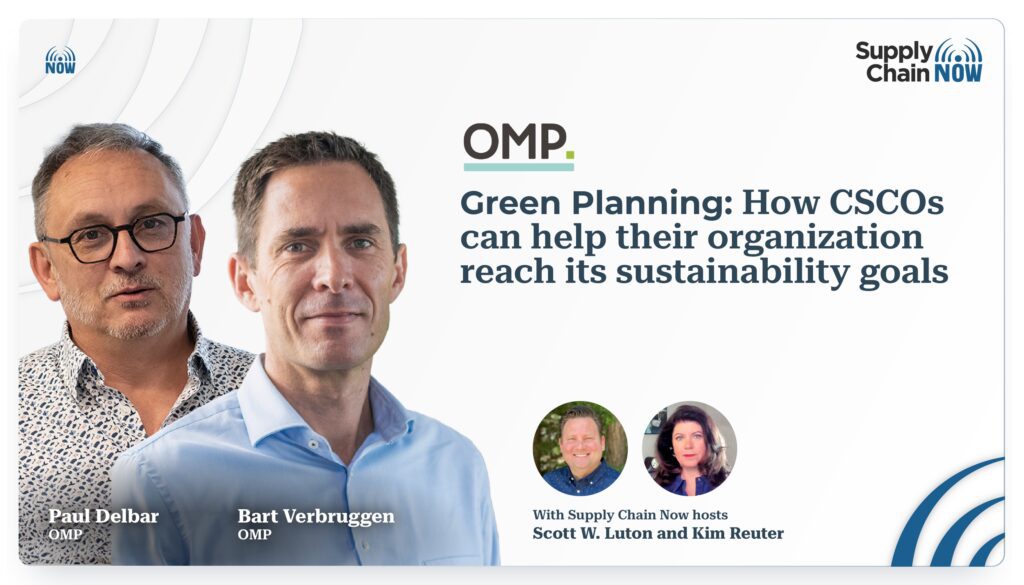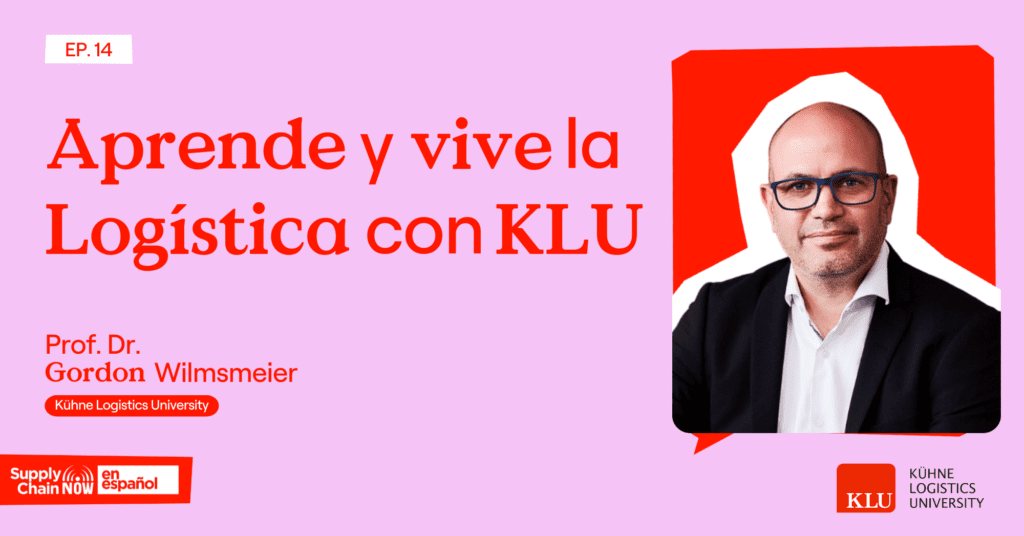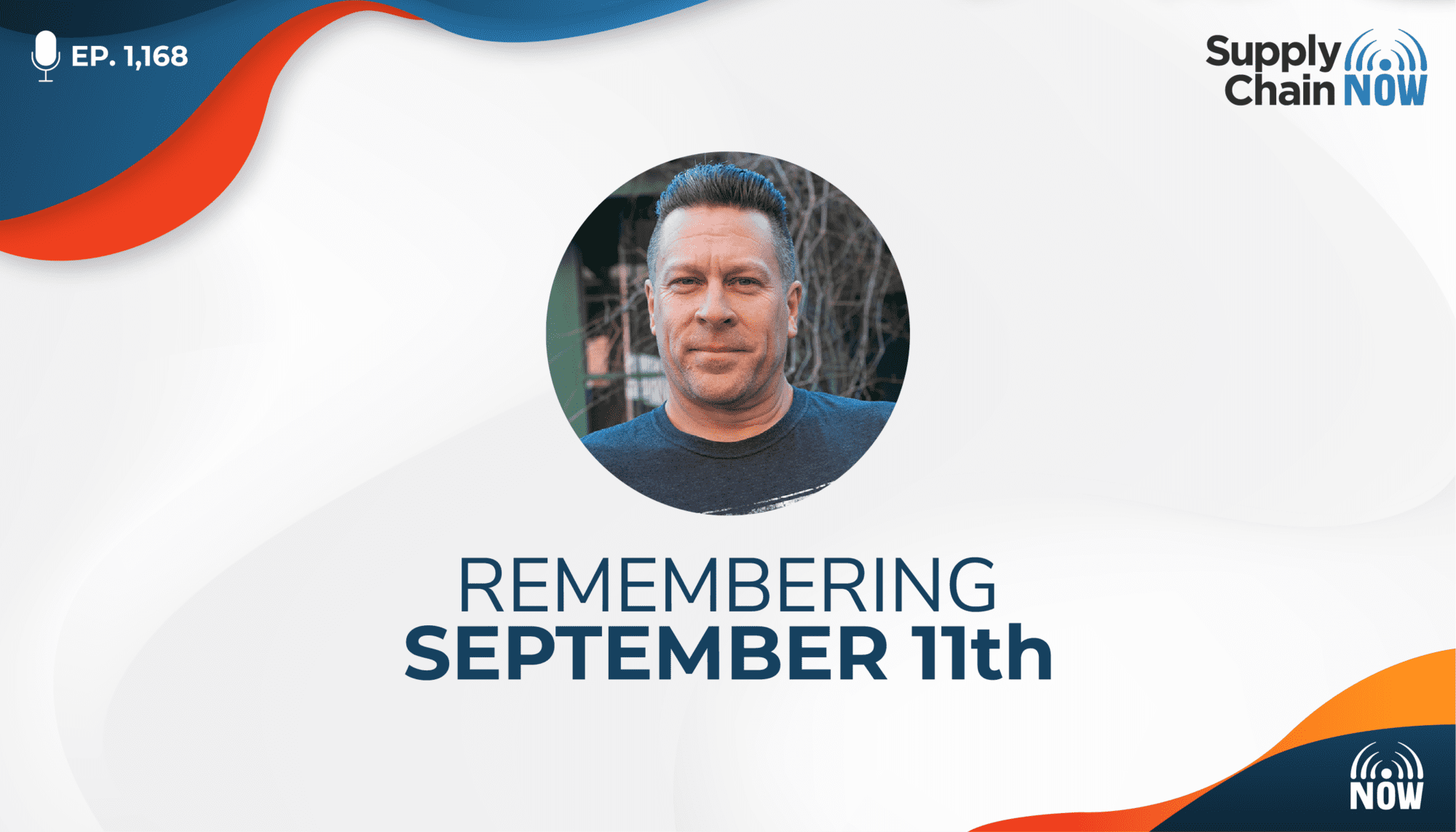Intro/Outro (00:03):
Welcome to Supply Chain. Now the voice of global supply chain supply chain now focuses on the best in the business for our worldwide audience, the people, the technologies, the best practices, and today’s critical issues, the challenges and opportunities. Stay tuned to hear from Those Making Global Business Happen right here on supply chain. Now
Scott Luton (00:32):
Good morning, good afternoon, good evening, wherever you are, Scott Luton here with you on Supply Chain. Now welcome to today’s show. So today of course is September 11th, 2023. It’s really hard to believe, but it’s been 22 years since that fateful day back in 2001, when 2,996 souls were lost here in the US throughout the year. But today especially our thoughts and prayers are with all the families and friends that have dealt with this tremendous loss through the years. In a special episode today, we’re gonna be focusing on lessons that we can learn from the tragic events that unfolded on nine 11 as we are featuring a special repeat episode that we had initially released back in September, 2020, almost three years ago. In this episode, Greg White, via his podcast Tequila Sunrise, where he shared a few thoughts on both his personal experience during nine 11, but also importantly the critical lessons that global industry might still learn from that day two decades ago. So stay tuned for wonderful perspective shared by Greg White. You
Greg White (01:51):
Know, this week on Friday is September 11th, and I didn’t start out to make this episode, but it just struck me again as it does about every year where I was on September 11th and what I was doing. So I’m gonna share a little bit of that with you and try to make it relevant to something we can learn about prevention, recovery, and resilience from nine 11 and maybe even something we can learn about tech. I can’t guarantee it though, as it turns out, 2001 was a a recession year and the.com bubble had just burst. And like the genius that I am, I, I decided I would start a company, <laugh> and I was in New York working with a company called Henry Schein Consulting on their supply chain and helping to build a technology to help them improve some critical elements of their supply chain. We had just started working there in August.
Greg White (02:57):
We’re about a month into things just getting settled in and putting some projects together to help their team become more effective, coordinating with some of their European entities to onboard them because they had just been acquired. And I was working in my office and my wife called me and said, Hey, a plane just flew into one of the twin towers. And honestly, what I thought was it, it happens from time to time. Some idiot in a 1 72 gets off course, isn’t paying attention, who knows, it’s just a terrible pilot and hits a building. It has happened before in New York, and that’s what I thought. And I went to ABC news.com on my laptop and was talking through it with my wife Vicki. And as we were talking about it, the second plane hit the other tower and it was in that moment that I knew something bad was happening.
Greg White (03:56):
<laugh>, she and I talked and a little bit more, and I suggested that she get the kids and get ’em out of school. And it was pretty clear that it was not a 1 72. Then we got off the phone and kept touch a little bit and because Henry Schein was a medical supply company and the news hit pretty quickly, we started turning around trucks that had left the distribution centers and they opened, they had closed all of the bridges and tunnels onto Manhattan, but they opened them back up for Henry Schein trucks to bring medical supplies back onto the island, many of which were never used. Of course, there weren’t many survivors in the affected areas. So my father called from Arizona, my sister was going to N Y U, and we had lost touch with her, and N Y U is near the area.
Greg White (04:54):
So he was worried, and of course he suggested that I try to give her a call, which I did. But of course, cell coverage was not good. First, everyone was on their phone. And then secondly, of course, many of the towers were in many of the cell repeaters and antenna were in the Twin Towers. So when they went down, so did cell coverage and many other things. I was there for a few days after that and I had told the folks that I was working with at First Chance, I got, of course, I was on Long Island, their office is in Melville, so we were waiting for the bridges to open for anyone to leave the island. And you know, I told the executive team there that as soon as the bridges did open, I was heading out. My daughter’s birthday is September 15th, and there was no way I was missing that even for a national catastrophe.
Greg White (05:53):
I got up every hour on the day, the night that they said the, it looked like the bridges would be opening. And as soon as I got the word, the bridges were opening, got my rental car loaded up with provisions, a little bit panicked, but uh, loaded up with provisions and started heading out around, I think it was around four o’clock in the morning. Fortunately, the car that I got was a white Ford Crown Victoria, so I didn’t have any trouble with pace. Of course, there was nobody on the road that time of the day. And even then, there were very few people on the road. Even the next morning I got in the left lane, went a hundred miles an hour through New York, New Jersey, Allstate, south Washington dc barely saw vehicles on the road until I got south to about Charlotte. When I got there, there were a lot of people exchanging cars, jumping from one car to another, trying to get to their destination from whoever they had connected with before.
Greg White (06:58):
Strangely, where I stopped, nobody was on their way to Atlanta. So I continued on down to Atlanta, and when I hit Atlanta, it was as if nothing had ever happened. The traffic was bumper to bumper, people were going about their day, and this was two, two, maybe three days later, people were going about their day pretty normally. I remember because it took 14 hours and 57 minutes and two hours of that roughly a thousand mile trip were in the Atlanta Metro area where uh, I just happened to hit the city in rush hour and traffic was just incredible. You know, what made me think about all of this was one of the big sayings to come out of nine 11 was never forget, and many still say never forget, but too soon it seems too many did. And, and I feel like this and other le lessons are applicable today, for instance, as we talk about covid now, right?
Greg White (08:02):
So many say the world is forever changed by covid. And I can’t say that’s untrue, but that’s not to say that humans are forever changed by it. We can study experience with previous catastrophes and see in many cases that there’s much we can learn from that we do very often forget. Let me tell you what I mean. My great grandparents and grandparents both went through the Great Depression and the Dust Bowl. So in the Midwest of the us Kansas in particular, there were seven years of drought, devastating drought and dust storms, frequently very little to no rain for seven years. And that had a big, big impact. My great grandparents always said, clean your plate. And things like, don’t get your hopes up too much. They may be dashed. Imagine how many times their hopes might’ve been dashed in seven years. When there’s drought, then there’s not, then there’s more drought, then there’s a dust storm that wipes away all the top soil, so you can’t grow anything or berries, farm implements and homes and people, and just about the time they get dug out, here comes another one.
Greg White (09:24):
So it, it was a very prevalent point of view for a certain generation, but what I realized even then was that there were different outlooks between my great-grandparents who were parents during that time, and my grandparents who were kids during that time, think about things like the Holocaust. Some say, uh, it never happened, right? They deny that it ever happened. And as I said, we promised to never forget nine 11, and yet it took us less than 10 years for us to dismiss Al-Qaeda as a threat to the us. And in fact, it took us an accumulation of terrorist incidents to motivate the US to locate and eliminate Osama Bin Laden. So why, why do we forget? We have many catastrophic disruptions throughout time, and you’d think we’d learn the lesson to be on the lookout or be diligent or to learn the lessons of those things forever.
Greg White (10:24):
You know, a, a catastrophic disruption may change people forever or at least change some people’s outlook forever that don’t get your hopes up. Never left my great-grandparents, but it took seven years of drought and famine to embed that outlook in just some of the population. So catastrophe doesn’t change all people forever, and it definitely doesn’t change the world forever. Why not? Well, my theory is that human memory is very short. And why is human memory short? Uh, what happens to the heightened awareness that inevitably comes after the great recession after nine 11, after the 1987 stock market crash, after the depression, after the Vietnam War, after a multitude of events have impacted much of or maybe the entire world, why don’t we maintain memory of these catastrophic events? Consider this, I I live this with nine 11 in the living generations of any crisis. You can break it down into roughly three means of experiencing a catastrophic event.
Greg White (11:40):
It’s experience. For some, it’s life changing, life altering, a personal impact and experience for some portion of the population. It’s a current event for the younger generation. It’s something you study, it’s something your parents felt but largely shielded you from as much as they could and something that in your particular age range, maybe you’re not able to contemplate completely. And for the youngest generation its history. In nine 11, 2001, I had a 10 year old, I had a four year old and my wife was eight months pregnant. So we had one who barely contemplated it, 10 years old, one who didn’t contemplate it at all, and one who was born after the event happened. So for at least the two youngest, it was really that history type event. It didn’t impact them in as visceral a way as it did my wife and I or their grandparents.
Greg White (12:48):
Those most impacted by the experience. If you think about it, have the least time left in active society, in the workplace, in media influence and in life. And therefore, the collective memory of humankind is relatively short. Let’s examine where we are today. Let’s not kid ourselves. We’re living in a reflection of history that many should remember right now. The eighties banking crisis and stock crash. Many of the same conditions in the stock market and the economy exists. There’s no way to deny that yet we also don’t know is it different? Is it the same? Is it close enough? Are we in denial? What can we do even if it is and, and if we can, should we do anything when, when these sorts of situations occur? We certainly can’t let fear grip us. We need to, as best we can, acknowledge and try to relate to history.
Greg White (13:54):
But that’s really difficult to do again, because of that collective short memory and also because I, I think people are eternally optimistic, right? It seems we must experience things to see possibilities as real and even then memory fades. So we really must experience things in the moment to see them as real. We are at least eternally optimistic and maybe even subconsciously in denial that such catastrophic disruptions can occur. What do we do? Well, I, I believe that we must acknowledge the faded memory concept as a human shortcoming and attempt to compensate for that. So consider what’s available to us today. What can we apply to a solution that won’t forget to expect or predict or prevent or deal with catastrophic disruption? Think about this. Predictive analytics and AI were honed on preventing terrorism after nine 11 and particularly after Richard Reed, the shoe bomber. We used these technologies to monitor activity on social networks in communication and in movement patterns of human beings to predict the likelihood of the next terrorist to strike.
Greg White (15:22):
It worked. In fact, we stopped a number of terrorist incidents post nine 11, and it’s how I got the idea for predicting customer purchases based on indicative activity. In fact, I’ve used this many times in a, in sales discussions, it sounds crazy now, but consumer terrorists, right? We’re trying to predict the next time that a consumer will terrorize a retailer by buying too much of a particular good toilet paper is a great example. More people would have done better if they had been predicting the customer rather than trying to predict the item, by the way. But that’s another, that’s a whole other episode. We can learn from this and we can impart things like technology to act on our behalf. Look, the old saying by Winston Churchill, those who fail to learn from history are doomed to repeat it. It’s proven again and again. And in fact that statement was not originally said by Churchill, but history is a little bit faded on who actually said it for the first time.
Greg White (16:35):
Will catastrophic disruptions change the world forever? To some it will feel like it. To some it will feel less like it. But in truth, no catastrophic disruptions will not change the world forever. They may change people’s perceptions of the world for their forever. It may cause people to change their activities and actions and perceptions for their forever, but ultimately, more of those people will move out and the collective memory will be altered more proportionally represented by those with less memory and less impact to their psyche of these events. And that is how we continue to fall into these traps, if you wanna call ’em that. What I believe is we must use our capability to impart the lessons of history into unemotional data banks, if you will, that never forget or minimize or misinterpret the conditions of the past unemotional tool sets that don’t fall into denial, that don’t try to rationalize, that don’t have to make themselves feel better about the future by, in some cases ignoring the realities of the past.
Greg White (17:56):
These mechanisms can be effective alerts to awaken us to potential danger, to enlighten us, to potential solutions, and to enable us to recover and boost resilience for the future. I’m hopeful that this is helpful for folks there, but the, the truth is we need to identify how we can be more predictive, more preventive, more responsive, more resilient in these kind of situations. And I believe it’s virtually impossible for us as human beings to do that. We need some technology to help us do that and overcome these kind of situations that that challenge us periodically. These we keep talking about, especially in supply chain, that these disruptions are gonna continue to come. We should use those opportunities to continue to learn and to continue to create a knowledge base that can continue to get better at predicting or preventing or at least responding and recovering to these things. So, you know, I always encourage you to acknowledge reality, but never be bound by it. And I implore you on September 11th at least to never forget. Thank you.
Scott Luton (19:19):
Thanks Greg. Really appreciate that message here today, folks. We have so much that we owe to so many, and that is a big part of the critical mantra to truly never forget. With that said, and on behalf of our entire team here at Supply Chain now, this is Scott Luton challenging you to do good, to give forward and to be the change that’s needed. And on that note, we’ll see you next time, right back here on Supply Chain now. Thanks everybody.
Intro/Outro (19:53):
Thanks for being a part of our supply chain now, community. Check out all of our programming@supplychainnow.com and make sure you subscribe to Supply Chain now, anywhere you listen to podcasts. And follow us on Facebook, LinkedIn, Twitter, and Instagram. See you next time on Supply Chain. Now.



